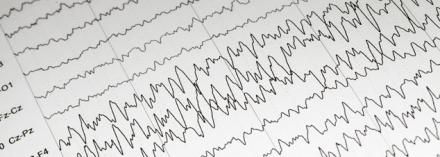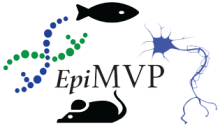
The epilepsies are a set of disorders characterized by recurring seizures, or disturbances in the electrical activity of the brain. Epilepsy affects people of all ages, from infants to the aged, and can result from many causes, including genetic variations, illness, head injury, or abnormal brain development. NIH/NINDS and its community-based research partners are dedicated to finding cures for the epilepsies and/or preventing epilepsy in individuals at risk for seizures.
Featured NINDS Epilepsy Research Initiatives
The NINDS established the Centers Without Walls program in 2010 to rapidly advance epilepsy research through promoting interdisciplinary, collaborative research. Four centers have been funded:
Estimates of Funding for Various Research, Condition, and Disease Categories
| Research/Disease Areas* | FY 2021 (Actual) | FY 2022 (Actual) | FY 2023 (Estimated) | FY 2024 Estimated |
|---|---|---|---|---|
| Epilepsy | $218 | $226 | $245 | $242 |
Additional funding information on epilepsy research projects funded by the ICARE members, including federal and nonprofit organizations can be accessed at the Interagency Collaborative to Advance Research in Epilepsy Research Portfolio.
*Dollars in millions and rounded
To learn more about this NIH Investment, please visit the Categorical Spending webpage and enter "Epilepsy".
Related Federal Programs
Other federal partners with epilepsy research programs include:
- The Department of Defense's Epilepsy Research Program.
- The CDC's Epilepsy Program.
Proceedings & Outcomes
Status Epilepticus after Benzodiazepines: Seizures and Improving Long Term Outcomes
This virtual workshop convened preclinical and clinical researchers, as well as relevant stakeholders to discuss and define the indications of potential therapeutics needed to improve outcomes following SE. Topics of discussion will include refractory SE, post SE neuropathology, current clinical trials, gaps in the research for follow-on treatments and barriers to transitioning therapies to the clinic. Outcomes of the workshop will include a clearer understanding of the unmet therapeutic needs and identification of key gaps in the research, increasing the potential for new therapeutics development.
Post-Traumatic Epilepsy: Models, Common Data Elements and Optimization
The conference will set the stage to optimize preclinical and clinical research to prevent epileptogenesis following TBI. The results will help improve biomedical research in posttraumatic epilepsy.
ICARE: Interagency Collaborative to Advance Research in Epilepsy, 2021
Epilepsy research needs reach across the missions of multiple NIH Institutes and Centers and across many organizations outside the NIH. As the primary NIH Institute for epilepsy research, NINDS leads this working group, with broad representation from the NIH, other Federal agencies, and the research and patient advocacy communities. Annual meetings provide a forum for sharing information about ongoing and planned epilepsy research activities, highlighting advances and discussing needs and opportunities, and promoting increased collaboration toward common research goals.
Curing the Epilepsies 2021
This conference, held January 4-6, 2021, was an opportunity for all epilepsy research stakeholders to provide input on the transformative research priorities for the field, and to come together to find ways to move forward "Curing the Epilepsies"
Accelerating the Development of Therapies for Anti-Epileptogenesis and Disease Modification
The “Accelerating the Development of Therapies for Anti-Epileptogenesis and Disease Modification” workshop, on August 6-7, 2018, brought together experts in the field of epilepsy to optimize and accelerate the development of therapies for anti-epileptogenesis and disease-modification in the epilepsies.
Benchmarks for Epilepsy Research
Benchmarks for Epilepsy Research
- 2021 Benchmarks for Epilepsy Research
- 2020 Benchmarks for Epilepsy Research
- 2020 Editorial: The Benchmarks: Progress and Emerging Priorities in Epilepsy Research
- Epilepsy Benchmarks Area I: Understanding the Causes of the Epilepsies and Epilepsy-Related Neurologic, Psychiatric, and Somatic Conditions
- Epilepsy Benchmarks Area II: Prevent Epilepsy and Its Progression
- Epilepsy Benchmarks Area III: Improved Treatment Options for Controlling Seizures and Epilepsy-Related Conditions Without Side Effects
- Epilepsy Benchmarks Area IV: Limit or Prevent Adverse Consequence of Seizures and Their Treatment Across the Life Span
- 2014 Benchmarks for Epilepsy Research
- Epilepsy Research Benchmarks Progress Update 2007-2009
- 2007 Epilepsy Research Benchmarks
Resources and Tools
Contacts
Adam Hartman, M.D. | Program Director, Office of Clinical Research
adam.hartman@nih.gov
George K. Essien Umanah, Ph.D. | Program Director, Channels, Synapses, and Circuits
umanahgk@ninds.nih.gov
Miriam Leenders, Ph.D. | Program Director, Channels Synapses & Circuits
miriam.leenders@nih.gov
Vicky Whittemore, Ph.D. | Program Director, Channels Synapses & Circuits
vicky.whittemore@nih.gov
Ben Churn, Ph.D. | Program Director, Channels Synapses & Circuits
severn.churn@ninds.nih.gov
Brian Klein, Ph.D. | Program Director, Epilepsy Therapy Screening Program
brian.klein@nih.gov
Funding Opportunities
Find Funding Opportunities | National Institute of Neurological Disorders and Stroke (nih.gov)
The mission of the ETSP is to facilitate the discovery of therapeutic agents to address unmet medical needs in epilepsy that currently includes drug resistant epilepsy, prevention of epilepsy development, and disease modification. The program provides opportunities for researchers from academia and industry in the U.S. and abroad to submit experimental therapeutics for screening in a battery of validated rodent epilepsy and seizure models. The ETSP is open to all types of therapeutic modalities including small and large molecules, biologics and device projects that align with the mission of the program.
This web resource contains public and non-confidential chemical structures and biological data for compounds which have been screened for efficacy and toxicity in animal models of epilepsy and related seizure disorders as part of the Epilepsy Therapy Screening Program (ETSP) at the National Institute of Neurological Disorders and Stroke (NINDS).
ICARE provides an interagency forum for sharing information about ongoing and planned epilepsy research activities.
The NINDS epilepsy common data elements provide data standards for clinical research in order to improve data quality and facilitate comparison and combination of data across studies.
The ERC provides information about grant and funding opportunities from non-profit and government organizations focused on epilepsy related research.





